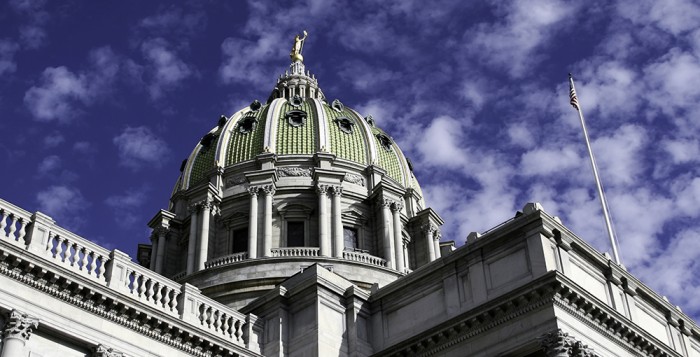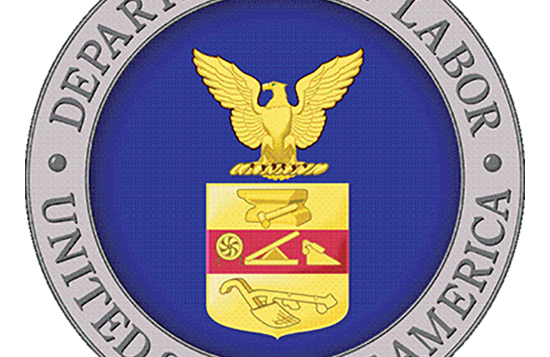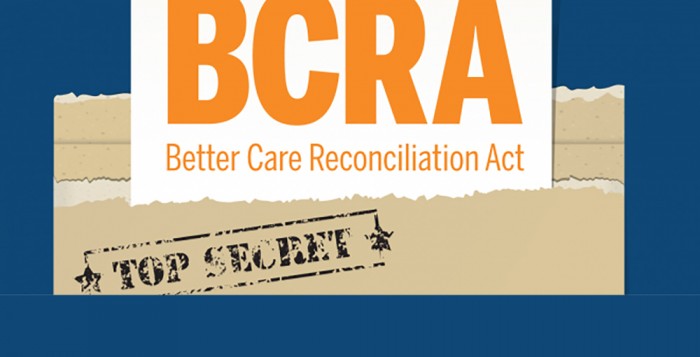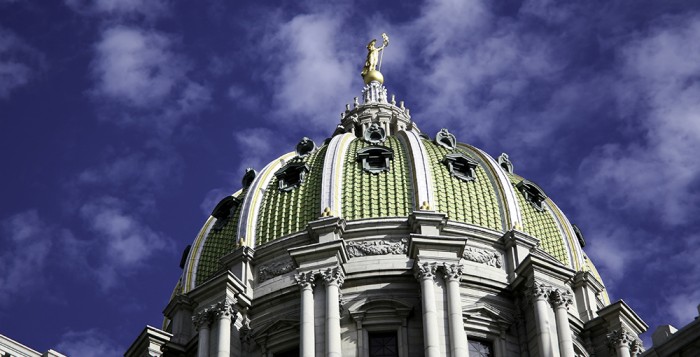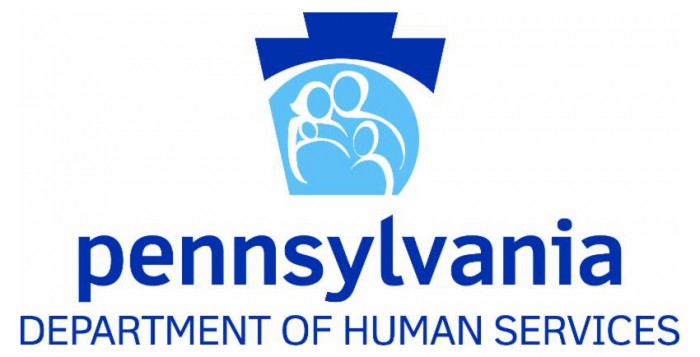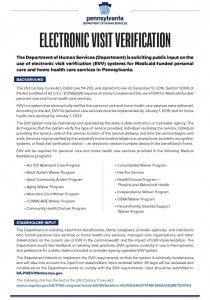Today, the Senate sent a package of five code bills back to the State House for their approval. Highlights of the codes bills are below:
Fiscal Code (House Bill 453)
The fiscal code directs how revenue is to be spent and contains local earmarks.
The fiscal code bill will:
- Transfer $30.4 million from a settlement with Volkswagen to the General Fund. The Commonwealth will receive $30 million from Volkswagen as part of efforts to settle lawsuits stemming from the automaker’s diesel emissions-cheating scandal;
- Require slot machine licenses issued this fiscal year be paid in full by June 30, 2018, thus generating an estimated $50 million for the General Fund;
- Require repayment of an earlier $165 million transfer from the Workers’ Compensation Security Fund by July 1, 2019, thus easing General Fund costs this fiscal year;
- Provide another $25 million for water and sewer projects awarded by the Commonwealth Financing Authority;
- Authorize a $10 surcharge collected by the Unified Judicial System to be applied to traffic citations, thus generating $10 million for the system.
Additionally, the fiscal code directs spending for a host of community projects identified only as an unnamed education program or health care institution in a county or city with a specific population classification.
Human Services Code (House Bill 59)
The Senate Rules Committee removed a few of its Republican-crafted provisions, though most were left intact. The provisions removed from HB 59 include:
- Eliminating a premium on disabled children and their families who receive Medical Assistance and have an annual income that exceeds 1000 percent of the federal poverty level;
- Removing language that would have limited Medical Assistance recipients’ choices for managed care organizations. The House’s version would have required DHS to have a one-year, annual enrollment for medical assistance for an individual who is Medicaid-eligible, so the individual would stay on the MA/MCO plan for one year;
- RCPA lobbied the Senate relentlessly to have the above provisions removed from HB 59.
The Senate left a provision in HB 59 that could potentially establish employment requirements for certain Medicaid recipients. The bill doesn’t inherently impose a work requirement on able-bodied Medicaid recipients, it would instead instruct the state’s Department of Human Services to seek waivers from the federal government to do so.
Administrative Code (House Bill 118)
The Administrative Code was the place where everyone was expecting the merger of the agencies to appear; however, the Administrative Code bill did not contain such language. Although the mergers are currently missing from the bill, there’s still plenty of time for them to be added.
The bill also:
- Includes language to transfer $200 million from the Pennsylvania Professional Liability Joint Underwriting Association (PPLJUA) to the General Fund in Fiscal Year 2017-18;
- Includes a proposal to transfer $200 million is to be transferred from the Pennsylvania Professional Liability Joint Underwriting Association (PPLJUA) to the General Fund. The PPLJUA is a non-profit association created by the state’s MCARE Act to offer medical liability insurance to health care providers.
- Provides for several hikes in state fees to generate revenue. Some fee hikes include:
- increasing the fee for a copy of a certified death record;
- increasing various inspection and permit fees in the department of Labor and Industry;
- increasing the fee for child welfare background checks from $10 to $13;
- authorizing the Pennsylvania State Police to increase the fee for criminal background checks; and
- setting fees on certain higher education institutions when they apply to operate in the state.
- Extends the sunset date of the Municipal Recycling Fee to Jan. 1 2023 and repeal the transfer to the Solid Waste Abatement Fund;
- Allows the Office of Attorney General to keep 25 percent of debt, taxes and accounts collected for the state up to $2.5 million per fiscal year;
- Requires Department of Revenue employees who have access to federal tax information to provide a criminal history record and fingerprints;
- Allows lawmakers on the Pennsylvania Commission on Crime and Delinquency Board to designate staff to be their alternate on the board;
- Requires the Department of Health to establish a detoxification program in licensed health care facilities;
- Requires the Department of Conservation and Natural Resources to study the feasibility of a state park in Wyoming County;
- Extends the expiration date for permits issued to water treatment facilities that exclusively treat water from conventional oil and gas well operations;
- Prohibits the closure of a correctional facility without a public hearing;
- Establishes alternate contracting procedures for construction and renovation of certain county jails;
- Exempts Living Independence for the Elderly (LIFE) programs from the Older Adults Daily Living Center licensing requirements; and
- Sets the dispensing fees for the Pennsylvania Pharmaceutical Assistance Contract for the Elderly (PACE) and PACE Needs Enhancement Tier (PACENET) at $10.49.
Public School Code (House Bill 178)
House Bill 178, approved by the Senate Rules Committee on Wednesday night, doesn’t include any reference to additional funding for the EITC, which could be a sticking point for the House Republican Caucus, which strongly favors additional dollars for the program.
Unlike the House’s bill, the Senate’s version also provides schools with the option to conduct security drills in lieu of fire drills and applies a new truancy law implemented last year to nonpublic schools beginning in the 2018-19 school year.
Tax Code Bill (House Bill 542)
The Senate approved a Tax Code bill containing $571 million in new or increased taxes, along with borrowing $1.3 billion. Those funds, along with a $200 million transfer of funds and $200 million from a gambling bill that has yet to be resolved, are directed at closing a $2.2 billion deficit projected for Fiscal Year 2017-18, $1.5 billion of which was rolled over from the recently completed 2016-17 fiscal year.
The proposed taxes include:
- A severance tax that will be in addition to the state’s existing impact fee paid by unconventional natural gas well drillers, with that fee to remain unchanged. The added severance tax, which is a levy of two-cents-per-thousand-cubic-feet of natural gas (Mcf) extracted for 2017-18, would be applied to the same wells subject to the impact fee and is expected to generate an additional $100 million during the current fiscal year, with that revenue directed into the General Fund;
- A Gross Receipts Tax (GRT) on natural gas consumers, at 5.7 percent, meaning an additional $5.70 cents for every $100 a household spends on the natural gas they purchase. More than half of the state’s households use natural gas for home heating;
- Increasing existing GRTs on electricity and telecommunications, from 5.9 percent to 6.5 percent for electricity, and from 5 percent to 6 percent for telecom bills. Combined, the planned GRT changes are estimated to deliver an additional $445.8 million in 2017-18;
- Attempting to have third-party vendors, who sell items through Internet marketplaces like Amazon and eBay, remit Pennsylvania’s sales tax if they don’t currently do so. That idea could generate another $43.5 million;
- Another $3 million in additional revenue is to be generated from taxing consumer fireworks (not those used by professional pyro-technicians license by the state) at a new 12 percent rate, which is in addition to the sales tax on such sales;
- Another $200 million from some type of gaming expansion, but that bill will not be considered this week by the Senate;
- Borrowing against the state’s expected Tobacco Settlement Fund payments. The planned bond, of up to $1.3 billion with no more than a 30-year repayment period, will have its borrowing costs either deducted from the more than $300 million the state receives each year from tobacco companies as part of the settlement, or from the General Fund; and
The bills above are now headed back to the House for their approval. It is yet to be determined if the House will return prior to their next scheduled Session date of Monday, September 11.
Questions contact Jack Phillips, RCPA Director of Government Affairs.








